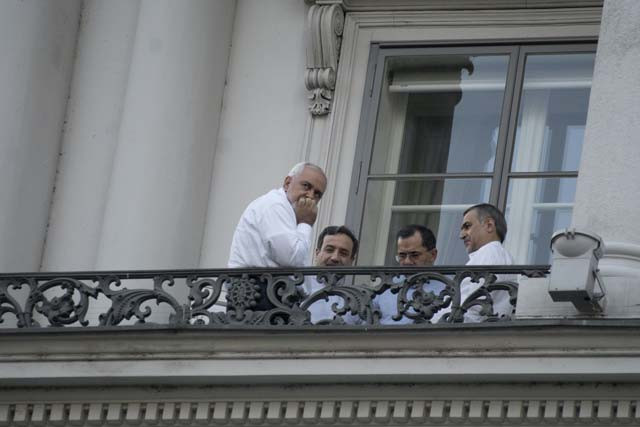Iran nuclear talks — another deadline missed
A deal between Iran and P5+1 could help assuage the Arab world’s nuclear fears

(From L) Iranian Foreign Minister Mohammad Javad Zarif, Iranian Deputy Foreign Minister Abbas Araqchi, Iran's deputy foreign minister for European and American Affairs, Majid Takht-Ravanchi, and Hossein Fereydoun, the brother of the Iranian president gather onto a balcony of the Palais Coburg Hotel, where the Iran nuclear talks meetings are being held in Vienna on July 11, 2015. PHOTO: AFP

The good news is that the talks are continuing even after the deadline has expired. But the not-so-good news is that the negotiations seemed to have hit a complicated roadblock with US Secretary of State John Kerry warning that the US could walk away from talks if “tough decisions don’t get made”. The Iranians have accused the US of reversing positions and upending agreements. One senior Iranian official lamented that Iran now feels it is in five bilateral negotiations since every country has different “red lines”. While the US and Iran seem to be blaming each other for dragging the negotiations, the rest of the negotiators belonging to P5+1 (the UK, France, Russia and China plus Germany) seemed reasonably hopeful of finalising a deal in due course. The French Foreign Minister, Laurent Fabius, said that “the last hundred metres of a marathon are the hardest. There are difficult points that remain, but things are all the same going in the right direction.”
Completing an accord later in the summer doubles the US congressional review period from 30 to 60 days, which, it is feared, could lead to a more prolonged debate that the White House had hoped to avoid. Mr Kerry, in trying to finalise a deal that would sail through Congress without any hitch, seems only to have managed to allow his detractors more time to take a closer look at the deal. The most heated arguments between the negotiating teams are said to have been over the question of whether the UN arms embargo on Iran should be lifted along with economic and financial restrictions, in return for accepting curbs on its nuclear programme. The debate is said to have split the six-nation group negotiating with Iran, with Russia and China siding with Iran against the US, the UK, France and Germany. Since Iran’s nuclear programme became public in 2002, the UN, the European Union and several individual countries have imposed sanctions in an attempt to prevent Iran from developing military nuclear capability. Iran insists its nuclear activities are exclusively peaceful, but the world’s nuclear watchdog claims that it has been unable to verify this.
Iran and the world powers agreed an interim deal in 2013, which saw the former gain around $7 billion in sanctions relief, in return for curbing uranium enrichment and giving UN inspectors better access to its facilities. World powers also committed to facilitating Iran’s access to $4.2 billion in restricted funds. Several rounds of sanctions in recent years have targeted Iran’s key energy and financial sectors, crippling its economy. As well as more recent sanctions aimed at Iran’s financial, oil and petrochemical sectors, the US has imposed successive rounds of sanctions since the 1979 Tehran hostage crisis, citing what it says is Iran’s support for international terrorism, human rights violations and refusal to cooperate with the International Atomic Energy Agency.
A deal between Iran and P5+1 would not only bring Iran out of its isolation and economic privation, it could also help assuage the Arab world’s nuclear fears and its suspicions regarding Iran’s regional ambitions could be put to permanent rest, hopefully. And at the same time, many countries in the region as well as the world would benefit immensely from Iran’s return to world markets. Hopefully, the Iran-Pakistan gas pipeline project, which is all but awaiting the lifting of sanctions, would be completed in due course of time easing to an extent our chronic energy crisis.
Published in The Express Tribune, July 13th, 2015.
Like Opinion & Editorial on Facebook, follow @ETOpEd on Twitter to receive all updates on all our daily pieces.



















COMMENTS
Comments are moderated and generally will be posted if they are on-topic and not abusive.
For more information, please see our Comments FAQ